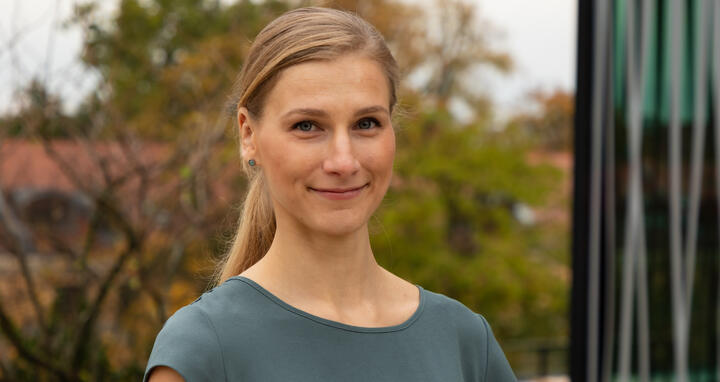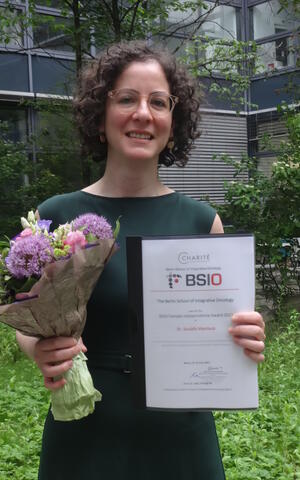Single-cell researcher Stefanie Grosswendt wins award
"I was delighted to receive the award and I am very grateful to the BSIO committee and my former mentors. The award gives us that little bit more freedom in our research, for example to test our methods more widely," says Grosswendt. The BSIO Female Independence Award is worth €25,000 and is intended to help establish a lab. The award and prize money will be shared by Stefanie Grosswendt and Dr Soulafa Mamlouk from the Institute of Pathology at Charité.
Grosswendt's research programme focuses on embryonic development and neuroblastoma, one of the most common types of cancer in early childhood. "Neuroblastoma begins in the womb," Grosswendt explains. "In these early childhood tumours, the cells are at different stages of development. The single-cell approaches we have developed are designed to give us a better understanding of this type of cancer and, in the long term, improve diagnosis and treatment."
Making single-cell analysis clinically useful
Grosswendt is one of four junior research group leaders recruited internationally by the Berlin Institute of Health in Charité (BIH), the Max Delbrück Center for Molecular Medicine in the Helmholtz Association (MDC), and Charité – Universitätsmedizin Berlin for a shared research focus: single-cell approaches for personalized medicine. The groups are based at the MDC in Berlin's Mitte district and therefore at the Berlin Institute for Medical Systems Biology (BIMSB).
The single-cell approaches we have developed are designed to give us a better understanding of this type of cancer and, in the long term, improve diagnosis and treatment.
Single-cell technologies allow researchers to track on a large scale which genes are active in individual cells at any given time, for example in a tumour. "The cellular programmes responsible for the mobility and plasticity of neuroblastoma cells are similar to those which are active during embryonic development. To discover them, we use single-cell technologies," says Grosswendt. "We are also developing new methods to investigate how cells interact and communicate with each other." Above all, she wants to make the possibilities offered by single-cell analysis useful to clinical research. For this reason, she and her team work closely with Professor Angelika Eggert, director of the Department of Pediatric Oncology and Hematology at Charité.
Stefanie Grosswendt earned her doctorate in systems biology at the MDC in 2015, under the supervision of Professor Nikolaus Rajewsky. She then went to Boston in the USA, where she researched the development of mouse embryos using single-cell technologies in the lab of Professor Alexander Meissner. In 2018 she followed Meissner to the Max Planck Institute for Molecular Genetics in Berlin. She has led the BIH junior research group "From Cell States to Function" since December 2020.
Other winner: Dr Soulafa Mamlouk, Charité
Dr. Soulafa Mamlouk
Researcher Dr Soulafa Mamlouk from the Institute of Pathology at Charité – Universitätsmedizin Berlin also received the award. She applies evolutionary concepts to investigate the progression and resistance of cancer under selective pressure, for example during cancer treatment. She was recently awarded a DFG grant for her project "Tracking the evolution of therapy resistance in colorectal cancer". Her research focuses on genetic heterogeneity and genetic changes in colorectal cancer.
Text: Wiebke Peters
Further information
- BSIO Female Independence Award
- Four new groups use single-cell methods to advance medicine
- Single cell approaches for personalized medicine
- Award for single-cell researcher Leif Ludwig
- Single-cell analysis at the MDC








